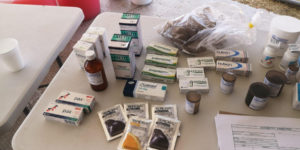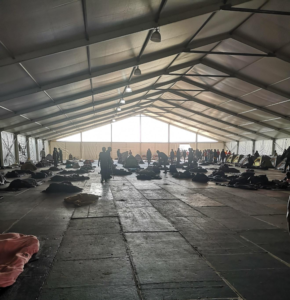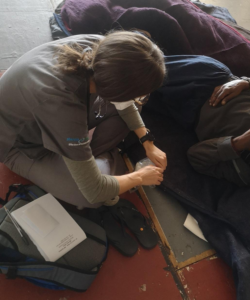By MJ Stowe (South African Network of People Who Use Drugs) and Julie Mac Donnell (South African Drug Policy)
Through the Support. Don’t Punish Initiative Programme, the International Drug Policy Consortium (IDPC), was able to provide financial assistance to the South African Network of People Who Use Drugs (SANPUD) to support street-based people who are currently experiencing opioid withdrawal under coronavirus disease 2019 (COVID-19) restrictions.
The grant will enable SANPUD to advocate for the rights and agency of people who use drugs (PWUD), as well as providing much-needed funds to demand accountability and make visible the repressive manner in which people who use drugs, and particularly street-based people, are being treated by public authorities.
South Africa’s lockdown policies came into force on 16 March and were meant to conclude on 21 April. However, a recent extension was announced, which will keep the country under a wide range of restrictions for an additional two weeks.
Under these lockdown restrictions, the South African government has stipulated that people may only leave their place of residence to: seek medical care; purchase groceries; visit the pharmacy; access banking services; obtain fuel for a vehicle; or, collect a social grant.
All other movement and travel are curtailed. These measures are enforced by the South African Police Service (SAPS) and law enforcement.
Unlike in most other countries, under this lockdown period, South Africans are not allowed to leave their homes to walk, run, walk their dogs or cycle on their bikes. People seen by law enforcement on the streets are stopped, questioned and fined/arrested if they are deemed to be outside their residence without the applicable authority.

Figure 1. Symptomatic medication being provided to treat some the symptoms experienced by street-based people in opioid withdrawal. Photograph by Julie MacDonald.
Street-based people dependent on opioids – mostly heroin, which is also referred to as unga, nyaope and whoonga – have been relocated to sites designed by local authorities. Their movement has been restricted, which means they are unable to access opioids.
The lack of consideration for the specific circumstances of this population have led to dozens going into opioid withdrawal. In Cape Town, some street-based people who are enrolled in the Step-Up Project’s opioid substitution therapy (OST) programme, were given a supply of methadone expected to cover the lockdown period.
However, outside of this programme, access to OST is extremely poor. This limitation adds to the constellation of stressors facing street-based people in the country, placed in a foreign environment with no access to opioids or symptomatic medication to stop or manage the onset of opioid withdrawal. This incredibly challenging situation is exacerbated by a lack of medical support services tailored to meet the needs of people who use drugs.
In our attempts to provide support in this situation, SANPUD has reached out to multiple stakeholders to acquire more funding and to establish a pathway to accessing methadone or buprenorphine-naloxone, which could be used by those opioid users currently residing in the City’s site in Strandfontein. At present, our efforts to secure this are on-going, with many working relentlessly.

Figure 2. A photograph showing the marquee tent in which many of our service beneficiaries are residing during the lockdown period Photograph by Julie Mac Donnell.
In the interim, we decided that the provision of symptomatic medication, which would address the symptoms of opioid withdrawal, would be the second best option. With the support of the IDPC, we have managed to re-structure some of the activities under the Initiatives Programme to provide immediate relief and support to the people in withdrawal at the City’s main site for street based people.
Over the last week, we have managed to purchase symptomatic medication and collaborate with a doctor to assess the people in opioid withdrawal and prescribe medication to alleviate some of the withdrawal symptoms. However, some residents’ painful experience of withdrawal is so extreme that they had to be transported by ambulance to the hospital for further care.

Figure 3. One of the doctors sits with a patient on the floor who is too ill to get up. Photograph by Julie Mac Donnell
One of them, a 34 year old woman, had been vomiting and suffering from such chronic diarrhoea that she was severely dehydrated and unable to even stand for the doctor to carry out a full medical assessment. When we arrived to assist her, she had vomit all over her blankets, her hair and the floor upon which she was sleeping.
While we acknowledge that symptomatic medication may only provide mild relief from the agonising withdrawal pains, we have seen that our efforts have made a difference. Arriving on site to happy ‘Hi sister’ calls from residents who know that help has arrived, is an uplifting experience.
Although we cannot provide medication for all the residents on the site, we have also offered some care to some critically ill people, regardless of their drug use. For example, a 67 year old man had only just come out of hospital before being moved to the City’s site. He had arrived with a urinary catheter and was also faecal incontinent. Sadly, this crucial medical information had not been given to the social worker on arrival, and he had been lying on the ground, soiling himself and experiencing pain from what the doctor concluded was an infection from the catheter not being properly looked after. He too was given some pain medication and an ambulance was called to take him back to hospital, for which he was tearfully grateful.
We also have had the joy of seeing several people come through their withdrawals who are now able to eat again and move around, pain-free and without nausea and vomiting. They have also been very supportive of the other residents who are still in the early days of withdrawal.
As we continue to implement these activities, we suspect we will be faced with considerable challenges. These challenges are likely to arise from the politics amongst operators and government entities responsible for the well-being of those people residing at these supposed ‘safe’ sites. However, as SANPUD, we remain committed to meeting people where they are at, a central tenet of harm reduction, and will continue to try our best to reach as many in the community of people who use drugs as we can, so as to provide them with much needed support during this complex and difficult time.